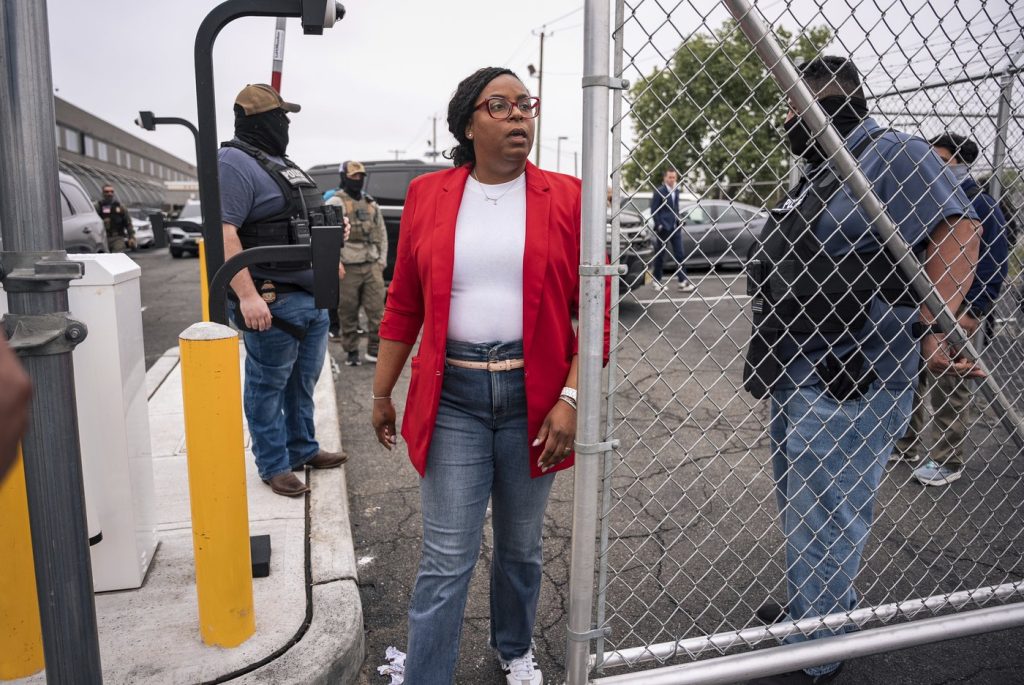WASHINGTON (AP) – New Jersey Rep. LaMonica McIver was surrounded by dozens of supportive Democratic colleagues in the Capitol just hours after pleading not guilty to federal charges brought by the Trump administration. The Democrats claim that the charges threaten the integrity of congressional power, with New York Rep. Yvette Clarke asserting, “If they can break LaMonica, they can break the House of Representatives.”
Federal prosecutors allege that McIver interfered with law enforcement during a visit to an Immigration and Customs Enforcement (ICE) facility in Newark, New Jersey, alongside two other House Democrats. McIver, however, has labeled the allegations as "baseless." This incident is part of a broader confrontation between congressional Democrats and the Republican administration, which is intensifying deportations across the country.
Senator Alex Padilla of California faced a confrontation as federal agents forcibly removed him from a news conference where Homeland Security Secretary Kristi Noem was speaking. Moreover, at least six groups of House Democrats have recently been denied entry into ICE detention centers. In early June, federal agents entered the district office of Rep. Jerry Nadler, D-N.Y., and briefly detained a staffer, further escalating tensions.
Congressional Republicans have dismissed the Democrats' actions as inflammatory and have expressed support for McIver's prosecution. This landscape has left congressional Democrats in a difficult position, struggling to perform oversight duties amid rising tensions with the White House and new restrictions on visits to federal facilities. New Jersey Rep. Rob Menendez remarked, “It’s our obligation to continue to do it on site at these detention facilities. And even if they don’t want us to, we are going to continue to exert our right.”
The looming threat of criminal prosecution for what were once routine oversight activities has alarmed many Democratic lawmakers. They find the current political atmosphere especially concerning given the recent targeted shootings of two Minnesota lawmakers, prompting discussions about enhanced security measures for members of Congress. Rep. Summer Lee of Pennsylvania emphasized the need for personal courage among lawmakers, expressing a desire for increased physical protection.
The arrests and detentions of lawmakers have driven some Democrats to take precautionary steps, consulting with the House general counsel about their rights and seeking personal legal advice. Rep. Jonathan Jackson of Illinois highlighted the need for Capitol Police to accompany lawmakers to facilities, given the threat of arrest by federal agents.
As the minority party in the House, Democrats lack the subpoena power necessary to compel the White House to provide information, which they argue is problematic due to the Trump administration's secrecy. Rep. Lucy McBath, D-Ga., voiced concerns over transparency, stating that Democrats are often learning about developments at the same time as the general public.
In response to these challenges, Democrats have employed public letters, confrontations at congressional hearings, and digital outreach to exert public pressure. Rep. Lauren Underwood of Illinois noted that inquiries during committee meetings have resonated with voters.
Seeking to maximize their oversight capabilities, congressional Democrats often rely on local lawmakers, business leaders, and advocates to serve as their eyes and ears on the ground, sometimes finding that Republicans maintain clearer communication with the White House. Rep. Sylvia Garcia from Texas explained the need to apply pressure on influential figures in key sectors, saying, “They’re the ones he’ll listen to.”
Despite these efforts, many House Democrats acknowledge that substantive oversight will remain elusive until they regain the majority in the House. Rep. Marc Veasey, D-Texas, asserted that “real oversight power and muscle” only come when Democrats control the House, underscoring the significance of winning future elections for their oversight capabilities.











